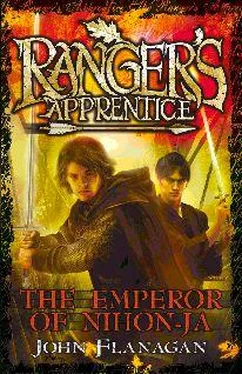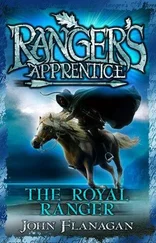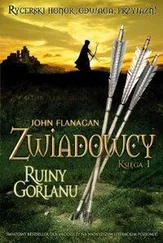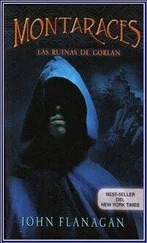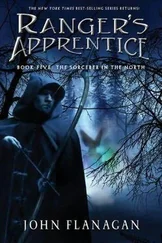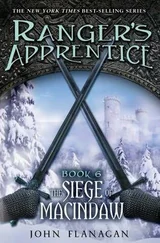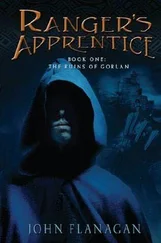John Flanagan - The Emperor of Nihon-Ja
Здесь есть возможность читать онлайн «John Flanagan - The Emperor of Nihon-Ja» весь текст электронной книги совершенно бесплатно (целиком полную версию без сокращений). В некоторых случаях можно слушать аудио, скачать через торрент в формате fb2 и присутствует краткое содержание. Жанр: Фэнтези, на английском языке. Описание произведения, (предисловие) а так же отзывы посетителей доступны на портале библиотеки ЛибКат.
- Название:The Emperor of Nihon-Ja
- Автор:
- Жанр:
- Год:неизвестен
- ISBN:нет данных
- Рейтинг книги:5 / 5. Голосов: 1
-
Избранное:Добавить в избранное
- Отзывы:
-
Ваша оценка:
- 100
- 1
- 2
- 3
- 4
- 5
The Emperor of Nihon-Ja: краткое содержание, описание и аннотация
Предлагаем к чтению аннотацию, описание, краткое содержание или предисловие (зависит от того, что написал сам автор книги «The Emperor of Nihon-Ja»). Если вы не нашли необходимую информацию о книге — напишите в комментариях, мы постараемся отыскать её.
The Emperor of Nihon-Ja — читать онлайн бесплатно полную книгу (весь текст) целиком
Ниже представлен текст книги, разбитый по страницам. Система сохранения места последней прочитанной страницы, позволяет с удобством читать онлайн бесплатно книгу «The Emperor of Nihon-Ja», без необходимости каждый раз заново искать на чём Вы остановились. Поставьте закладку, и сможете в любой момент перейти на страницу, на которой закончили чтение.
Интервал:
Закладка:
'Indeed there is, Wakir. Our fighting methods depend on discipline and cohesion. The men in each century fight as one unit.'
'Once a battle begins, my men fight largely as individuals,' Selethen said. His voice indicated that he saw little value in this style of co-ordinated, almost machine-like manoeuvring. 'Of course, it's the commander's job to bring his forces into the most advantageous position on the field. But after that, I find it's almost impossible to control them as individuals. Best to let them fight their own way.'
'That's why all this drilling is necessary,' Sapristi replied. 'Our men become accustomed to reacting to orders. It becomes instinctive. We teach them a few vital drills, and practise them over and over. It takes years to train an expert warrior. Constant drilling means we can have a legion ready to fight effectively in less than a year.'
'But they can't possibly learn to be expert swordsmen in so short a time?' Will asked.
Sapristi shook his head. 'They don't have to. Watch and learn, Ranger Will.'
'Alt!' The command rang out and the three companies crashed to a stop as one.
'A cloud of dust and a line of statues,' Will mused.
Across the parade ground, a trumpet blared and warriors began to appear from behind the buildings there. They moved quickly to form an extended line of battle – not as disciplined or as rigidly maintained as the century's formation. They were armed with wooden practice swords – long-bladed swords, Will noticed, and round shields. Roughly one-quarter of them carried recurve bows in addition to their swords.
At a command, the 'enemy' began to advance across the parade ground. The line undulated as some sections moved faster than others.
'Tre rige!' shouted the century commander. Halt glanced a question at Sapristi.
'Form three ranks,' the general translated. 'We don't use the common tongue for field commands. No sense in letting the enemy know what you have in mind.'
'None at all,' Halt agreed mildly.
Moving smoothly and without any undue haste, the three companies trotted into position, three ranks deep and thirty-three wide. The ranks were separated from each other by about a metre and a half.
The enemy force halted their advance some sixty metres from the rigid lines of legionnaires.
The wild-looking enemy tribesmen brandished their weapons and, at a shouted command, those among them with bows stepped forward, arrows ready on the string. The observers heard the faint sound of fifty arrows rasping against the bows as they were drawn back to the fullest extent. At the same time, the centurion called his counter order.
'Tartaruga! Pronto!'
Ninety-nine man-high, curved shields came round to the front, with a rattle of equipment.
'Tartaruga means "tortoise",' Sapristi explained. 'Pronto means "ready".'
The enemy commander shouted an order and the archers released a ragged volley. As the first arrow sped away, the Toscan centurion bellowed:
'Azione!'
'Action,' translated Sapristi.
Instantly, the soldiers reacted. The front rank crouched slightly, so that their shields covered them completely. The second and third rank stepped close. The second rank raised their shields to head height, interlocking them with those of the front rank. The third rank did likewise. The hundred men of the century were now sheltered by a barricade of shields to the front and a roof of shields overhead.
Seconds later, the volley of arrows clattered against them, bouncing off harmlessly.
'Just like a tortoise,' Will observed. 'Who are the enemy?'
'They're all warriors from neighbouring countries and provinces who have elected to join our empire,' Sapristi replied smoothly.
Halt regarded him for a moment. 'Did they elect to join?' he asked. 'Or was the decision made for them?'
'Perhaps we helped a little with the decision-making process,' the Toscan general admitted. 'In any event they are all skilled and experienced warriors and we use them as auxiliaries and scouts. They are extremely useful for demonstrations of this kind. Watch now.'
The attacking force had stopped at the point from which they had fired the volley of arrows. The general pointed to where a group of orderlies were running onto the field, each one carrying a rough outline of a man cut from light wood. There were at least one hundred of them, Will estimated. He watched curiously as the men placed the upright targets in place, thirty metres from the front rank of the legionnaires.
'For the purpose of the demonstration,' Sapristi said, 'we'll assume that the enemy has reached this position in their advance. We don't use real warriors for this part of the exercise. It's too costly, and we need our auxiliaries.'
The orderlies, many of them glancing nervously at the still ranks of legionnaires, ran from the field once their targets were in position.
Will leaned forward eagerly. 'What happens now, General?'
Sapristi allowed himself a small smile.
'Watch and see,' he said.
Nihon-Ja, some months earlier Horace slid the screen to one side, grimacing slightly as he eased the door open. By now, he had learned to handle these light wood and paper structures carefully. In his first week in Nihon-Ja he had destroyed several sliding panels. He was used to doors that were heavy and needed some effort to get them moving. His hosts were always quick to apologise and to assure him that the workmanship must have been faulty but he knew the real reason was his own clumsiness. Sometimes he felt like a blind bear in a porcelain factory.
Emperor Shigeru looked up at the tall Araluan warrior, noticing the extreme care he took with the door, and smiled in genuine amusement.
'Ah, Or'ss-san,' he said, 'you are most considerate to spare our flimsy door from destruction.'
Horace shook his head. 'Your excellency is too kind.' He bowed. George – an old acquaintance of Horace's from his days in the Ward at Redmont and his protocol adviser on this journey – had impressed upon him that this was not done out of any sense of self-abasement. The Nihon-Jan bowed to each other routinely, as a mark of mutual respect. In general, the depth of the bow from both sides was the same. However, George had added, it was politic to bow much deeper to the Emperor than you might expect him to bow to you. Horace had no problem with the custom. He found Shigeru to be a fascinating and gracious host, well worthy of deference. In some ways, he reminded Horace of King Duncan – a man for whom Horace had the deepest respect.
The Emperor was a small man, much shorter than Horace. It was difficult to estimate his age. The Nihon-Jan all seemed much younger than they really were. Shigeru's hair was tinged with grey, so Horace guessed that he must be in his fifties. But small as he might be, he was amazingly fit and possessed a deceptive wiry strength. He also had a surprisingly deep voice and a booming laugh when he was amused, which was often.
Shigeru clicked his tongue lightly as a signal that the young man didn't need to hold the position any longer. As Horace straightened up, the Emperor bowed in reply. He liked the muscular young warrior and he had enjoyed having him as a guest.
In training sessions with some of the leading Nihon-Jan warriors, Shigeru had seen that Horace was highly skilled with the weapons of his own country – the sword, longer and heavier than the curved Nihon-Jan katana, and the round shield that he used so effectively. Yet the young man showed no sense of arrogance and had been keen to study and compliment the techniques of the Nihon-Jan swordsmen.
That was the purpose of Horace's mission. As a Swordmaster in Araluen, and as a potential Battlemaster, it made sense that Horace should be familiar with as wide a range of fighting techniques as possible. It was for that reason that Duncan had despatched him on this military mission. In addition, Duncan could see that Horace was becoming bored. After the heady excitement of his clash with the Outsiders in company with Will and Halt, it was easy for the young man to become impatient with the humdrum routine of life at Castle Araluen. Much to the chagrin of Duncan's daughter, Cassandra, who enjoyed Horace's company more and more, he had sent him on this fact-finding mission.
Читать дальшеИнтервал:
Закладка:
Похожие книги на «The Emperor of Nihon-Ja»
Представляем Вашему вниманию похожие книги на «The Emperor of Nihon-Ja» списком для выбора. Мы отобрали схожую по названию и смыслу литературу в надежде предоставить читателям больше вариантов отыскать новые, интересные, ещё непрочитанные произведения.
Обсуждение, отзывы о книге «The Emperor of Nihon-Ja» и просто собственные мнения читателей. Оставьте ваши комментарии, напишите, что Вы думаете о произведении, его смысле или главных героях. Укажите что конкретно понравилось, а что нет, и почему Вы так считаете.
